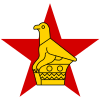| History of Zimbabwe | ||||||||||||||||||||||||||||||||||||||||||
|---|---|---|---|---|---|---|---|---|---|---|---|---|---|---|---|---|---|---|---|---|---|---|---|---|---|---|---|---|---|---|---|---|---|---|---|---|---|---|---|---|---|---|
 | ||||||||||||||||||||||||||||||||||||||||||
Ancient history
|
||||||||||||||||||||||||||||||||||||||||||
White settlement pre-1923
|
||||||||||||||||||||||||||||||||||||||||||
Europeans first came to the region in southern Africa today called Zimbabwe in the sixteenth century, when Portuguese colonials ventured inland from Mozambique and attacked the Kingdom of Mutapa, which then controlled an area roughly equivalent to eastern Zimbabwe and western Mozambique. Portuguese influence over Mutapa endured for about two centuries before fading away during the 1690s and early-1700s (decade). During the year of 1685, French Huguenots emigrated to present-day South Africa and whilst some settled there, others moved further north into the continent. Those who did, settled within modern-day Zimbabwe, Mozambique and Botswana, and co-existed with the indigenous people; most of whom, in Zimbabwe, were the Naletale people.
During the 1880s and 1890s, the British South Africa Company initiated colonisation by Europeans, backed by a royal charter from Queen Victoria: company rule over the country began in 1890, when the Pioneer Column marched to Mashonaland, founded Fort Salisbury and settled in the area.
The company domain was named "Rhodesia" after its founder, Cecil Rhodes, in 1895; the portion south of the Zambezi became officially called Southern Rhodesia in 1898. Concurrently with the expiry of the company's charter in 1923, Southern Rhodesia was granted responsible government by the UK, and became a self-governing colony.
© MMXXIII Rich X Search. We shall prevail. All rights reserved. Rich X Search
